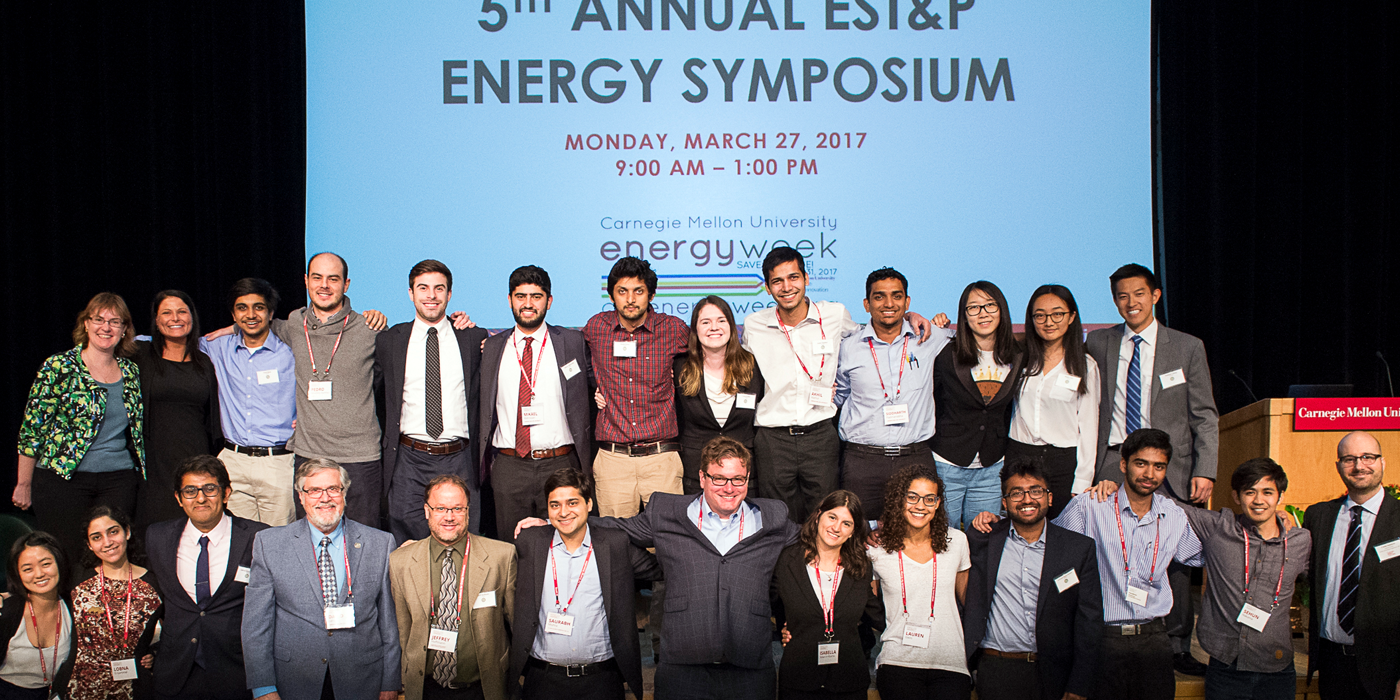EST&P master's students hosted 5th Annual Energy Symposium

The 5th Annual EST&P Energy Symposium was organized by masters student's in the Energy Science, Technology and Policy (EST&P) program in the College of Engineering and jointly supported by Carnegie Mellon’s Scott Institute for Energy Innovation.
Over 100 people attended the Energy Symposium on Monday, March 27th in the Cohon University Center which kicked off CMU Energy Week . The Energy Symposium’s theme of Low-Carbon Energy included advancements in both renewable and conventional energy. The morning session featured an Innovation Talks Competition where students presented novel ideas in low-carbon energy. The afternoon session featured a Panel of distinguished industry leaders and university professors who shared a conversation on the future of low-carbon energy and the associated career opportunities.
Energy Symposium website: www.cmu-energy-symposium.org
5th Annual Energy Symposium photos: https://estp.shutterfly.com
Summary:
The Energy Symposium began with Dr. David Landis, Executive Director, EST&P, who welcomed guests and gave an overview of the day’s proceedings. He was followed by EST&P student, Mikael Matossian, Innovation Talks chair, who introduced the first-ever Innovation Talks, a competition for students to pitch their original ideas in technology, business, and policy concerning low-carbon energy. Six teams were selected as finalists to present at the event. Three judges evaluated the competition: Dr. Jovan Ilic (Electrical and Computer Engineering, CMU), Dr. Brandon Grainger (Electrical and Computer Engineering, University of Pittsburgh), and Dr. Daniel Siewiorek (Electrical and Computer Engineering & School of Computer Science, CMU).
Six finalists presented their ideas, ranging from waste collecting robots to new designs for rooftop solar tariff structures, to the audience in the form of short pitches, followed by a few minutes of Q&A with the judges. The teams included “That’s Not Fair: Tariff Structures for Electricity Markets with Rooftop Solar” (Siddharth Singh), “Energy Harvesting for Railroad Optimization” (Keith Hyde, Emile Fares, and Jake Lake), “Robotic Applications in Landfills” (Max Kiefer, Tanvil Shah, Paul Soumyajit, and Nur Orak), “Thermoelectric Generation and Subway Trains” (Sonam Mahawar, Jacob Davidson, Yifei He, Maca Tabilo, and Nick Stone), “Rooftop Integration of Solar Panel and Radiative Cooling Reflector” (Yuzhe Liu and Siliang Lu), and “City Level Remote Energy Audit” (Nilesh Bansal). A brief networking session and lunch followed the competition. Using a rubric that provided scores for originality, communication, depth of analysis, and, impact on low-carbon energy, the judges deliberated which projects would be chosen as the top three.
Mikael announced the Innovation Talks winners as decided by the judges: “Energy Harvesting for Railroad Optimization” (1st), “Rooftop Integration of Solar Panel and Radiative Cooling Reflector” (2nd), and “Thermoelectric Generation and Subway Trains” (3rd). Prizes of $500, $300, and $200 were awarded to each of the three teams, respectively. More information about the competing teams can be found here>>.
Following the compeition, a panel of industry experts discussed the future of low-carbon energy and associated career opportunities. Prof. Costa Samaras moderated the panel and the discussion began with the panelists addressing the transition from fossil fuel energy to low-carbon energy. The panelists agreed that CCS technology and renewables are critical to a low carbon future. Over 60% of added capacity last year came from solar and wind power. Tim Fox talked about the current policy environment in the new administration. The policies that are driving solar are at the state-level, and the industry doesn’t expect Congress to phase out energy policies faster than they are scheduled to. The conversation then switched to Paul DeCotis, who talked about how renewable technologies fit into a deregulated state like New York. The rest of the panel added their thoughts on integrating distributed energy resources into the grid without upsetting prices or reliability. The next topic related to the rebound effect. Mitch Small believes that rebound happens and that we should try to stay in front of it by developing more efficient and cleaner processes. The moderator then asked the panel about how students could get involved in the renewable industry. The general consensus from the panel was that energy companies look for students who are curious and passionate and for students who have good communication skills. They are also looking for students who understand the opposing forces and real constraints on the energy industry. The next conversation topic was the effect of storage on levelized costs of electricity. Solar is at grid parity with retail rates in many parts of the country, but it has a lot of progress to make in wholesale markets. The panel discussion concluded with an audience question: “what is an energy-related problem that keeps you awake at night?” Mitch Small said narrow bets and path dependency; Tom Tarka said longer lead times to build infrastructure; Tim Fox said Congress; Sharon Pillar said fossil fuel lobbying; and Paul DeCotis said the large amount of capital required in the energy industry. More information on the panelists can be found here>>.
